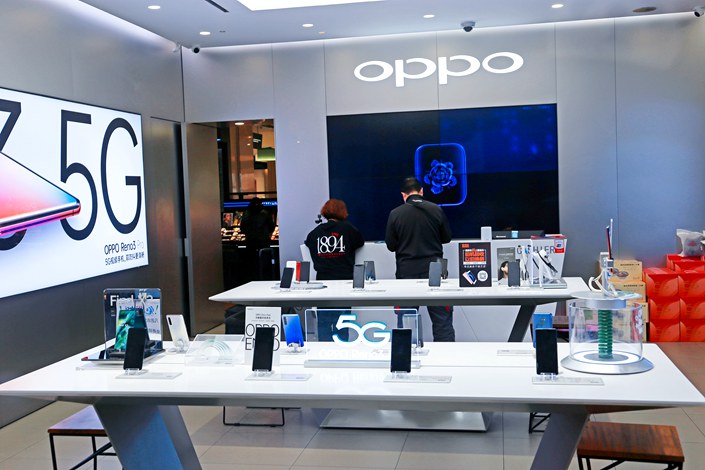Oppo Boosts Smartphone Production Over 50%, Looking to Fill Huawei Void

Chinese smartphone-maker Oppo Co. Ltd. plans to significantly increase its smartphone production, a move that could be aimed at filling a void left by U.S.-sanction struck Huawei Technologies Co. Ltd.
Oppo has ordered its contract manufacturers to make 110 million units in the second half of this year, a company source told Caixin. Combined with the 60 million units it ordered in the first half, that brings its figure for 2020 to 170 million, a record for the company.
From 2017 to 2019, Oppo shipped about 110 million devices globally each year, according to data from research firm IDC.
Oppo’s plan to ramp up production comes even as the global smartphone market has shrunk in recent years, with the years-long sales slump only exacerbated by the Covid-19 pandemic. In the first half, global smartphones shipments fell 13.94%, according to IDC.
The market’s prospects are expected to improve in the second half if the pandemic continues to slow worldwide. But IDC expects that total smartphone shipments worldwide will drop by 11.9% to 1.2 billion units for this year as a whole.
Analysts said the ongoing woes of Huawei are likely behind Oppo’s move. After the U.S. government last month announced rules to further tighten Huawei’s access to U.S. chipmaking technology, some analysts predicted that the world’s largest smartphone vendor may face a dire threat if its current chip stockpile runs out early next year.
According to the latest rules, any company in the world that uses any U.S. technology will need a government license to sell chips to Huawei. The policy closed loopholes for Huawei under rules announced in May that still allowed it to buy off-the-shelf chips from third-party companies as long as they were not designed by Huawei.
Huawei surpassed South Korea’s Samsung Electronics Co. Ltd. as the world’s largest smartphone seller in the second quarter of this year, largely due to its strong performance in the domestic Chinese market, where the majority of the world’s phones were sold.
The impact from the U.S. sanctions has started to be felt, however. Earlier last month, Yu Chengdong, the CEO of Huawei’s consumer business, said the company’s flagship Mate 40 smartphones will be the last Huawei model to be equipped with its self-designed Kirin 9000 chip.
Huawei’s sales in markets outside China have already taken a hard hit since the middle of last year, when the U.S. government first targeted the company by placing it onto an economic blacklist list that barred U.S. companies from doing business with it without a license. Huawei’s sales outside its home market have since plummeted after Google stripped its phones’ access to popular services like Google Play.
Oppo is not the only company that is looking to pick up some market share from Huawei’s woes. Xiaomi Corp., another major Chinese smartphone-maker, recently announced that it would up its efforts to grow in the European market, one of Huawei’s strongholds.
Contact reporter Mo Yelin (yelinmo@caixin.com) and editor Joshua Dummer (joshuadummer@caixin.com)
Download our app to receive breaking news alerts and read the news on the go.

- PODCAST
- MOST POPULAR






